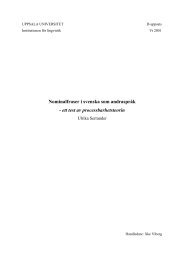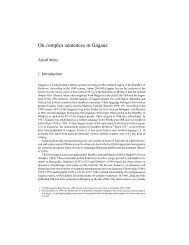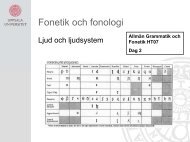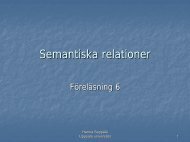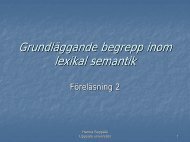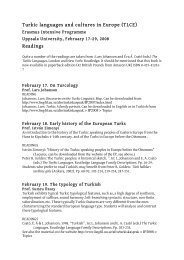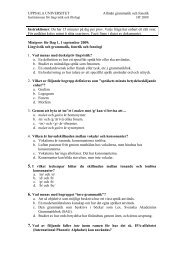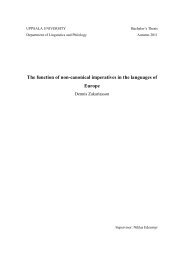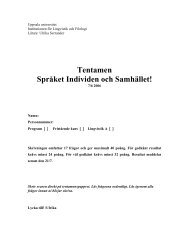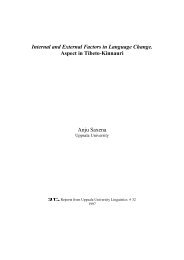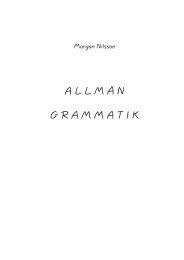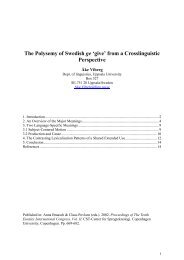Preaspiration in the Nordic Languages: Synchronic and Diachronic ...
Preaspiration in the Nordic Languages: Synchronic and Diachronic ...
Preaspiration in the Nordic Languages: Synchronic and Diachronic ...
You also want an ePaper? Increase the reach of your titles
YUMPU automatically turns print PDFs into web optimized ePapers that Google loves.
As to preaspirated stops <strong>in</strong> Chechen <strong>and</strong> Ingush, <strong>in</strong>formation is<br />
scarce <strong>in</strong>deed. Catford (1977:114) claims that preaspiration occurs <strong>in</strong><br />
both languages, but does not go <strong>in</strong>to detail regard<strong>in</strong>g its distribution or<br />
phonetic character. The only o<strong>the</strong>r source of <strong>in</strong>formation is Hansson’s<br />
personal communication with Johanna Nichols (of <strong>the</strong> University of<br />
California, Berkeley) who “confirmed <strong>the</strong> existence of preaspiration <strong>in</strong><br />
Ingush” (Hansson 1997:27; my translation).<br />
Turn<strong>in</strong>g now to Central Asia, Roos (1998) has described preaspiration<br />
<strong>in</strong> Western Yugur, an Eastern Turkic language spoken <strong>in</strong> <strong>the</strong> Gnsù<br />
prov<strong>in</strong>ce <strong>in</strong> <strong>the</strong> People’s Republic of Ch<strong>in</strong>a. Roos uses data from a variety<br />
of written sources, <strong>and</strong> has also made (impressionistic) analyses of a<br />
record<strong>in</strong>g of a male Western Yugur speaker. Accord<strong>in</strong>g to Roos, most<br />
voiceless consonants <strong>in</strong> Western Yugur, <strong>in</strong>clud<strong>in</strong>g stops, affricates <strong>and</strong><br />
fricatives, can be preaspirated. Also, voiceless liquids occur before voiceless<br />
consonants; this has been analysed as part of <strong>the</strong> preaspiration phenomenon.<br />
The phonetic shape of this preaspiration varies with context:<br />
In Western Yugur, preaspiration generally occurs as an h-like element<br />
[h], but before [q] as a fricative []; it may be realised as [] near <strong>the</strong><br />
front high vowels, <strong>and</strong> as [] near []. […] <strong>Preaspiration</strong> may spread<br />
over <strong>the</strong> entire vowel, result<strong>in</strong>g <strong>in</strong> a completely whispered vowel, e.g.<br />
[]; especially high vowels when occurr<strong>in</strong>g between [s, ] <strong>and</strong> a velar<br />
of uvular plosive [k, q] […] tend to be whispered.<br />
(Roos 1998:30) 1<br />
The type of variation Roos describes here is very similar to that<br />
found <strong>in</strong> <strong>the</strong> preaspiration data reviewed <strong>in</strong> Chapter 4, especially <strong>the</strong> realisation<br />
of oral friction <strong>in</strong> lieu of aspiration proper. Roos cites numerous<br />
examples from <strong>the</strong> production of his <strong>in</strong>formant, e.g: t / t ‘horse,’<br />
kœp ‘many,’ sq ‘to squeeze,’ qq ‘to fear’ <strong>and</strong> ps ‘to<br />
press.’ 2<br />
Historically, Roos expla<strong>in</strong>s that Common Turkic non-<strong>in</strong>itial sequences<br />
of short vowel <strong>and</strong> fortis stop (*p, *t, *k) are reflected with preaspiration<br />
<strong>in</strong> Western Yugur. Fortis stops preceded by a long vowel are reflec-<br />
1 The phonetic notation of <strong>the</strong> orig<strong>in</strong>al has been kept <strong>in</strong> this citation.<br />
2 These transcriptions are from Roos’s text (hence <strong>the</strong> use of <strong>the</strong> double brackets—cf.<br />
Chapter 3.1) <strong>and</strong> have been adapted to <strong>the</strong> current IPA notation. The follow<strong>in</strong>g forms<br />
appear <strong>in</strong> <strong>the</strong> orig<strong>in</strong>al: t / t, kp, sq, qq <strong>and</strong> ps.<br />
– 28 –



